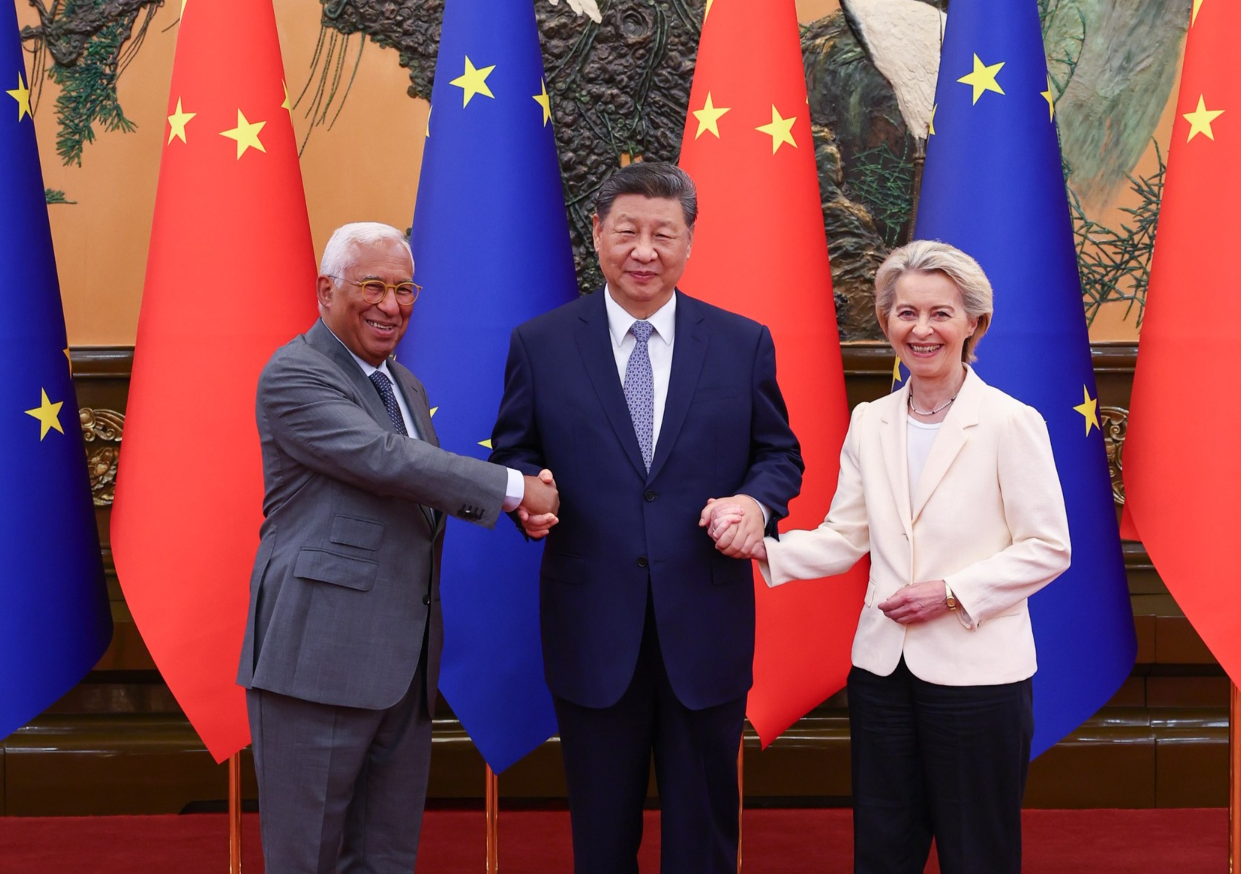Over the past 50 years since diplomatic relations were established between China and the European Union, differences have never become insurmountable obstacles. This is the proven pattern and the one to which they should continue to adhere in the future.

During his meeting on July 24 with European Council President Antonio Costa and European Commission President Ursula von der Leyen, President Xi Jinping noted that China and the European Union are “big guys” in the international community and that “we must firmly grasp the correct direction of China-EU relations and work together to create a brighter future in the next 50 years of our relationship.”
Xi made this statement against the backdrop of a complex, changing international situation, with new uncertainties emerging in China-EU relations. It is undeniable that there are differences between China and the EU. However, there is no fundamental conflict of interest. Therefore, as long as both “big guys” exercise wisdom, they should be able to maintain their status — as Xi put it, a relationship of “mutual respect, seeking common ground while reserving differences, open cooperation, mutual benefit and win-win results.”
Mutual respect is the prerequisite foundation upon which great wisdom can play out. It’s a matter of transcending zero-sum games and Cold War thinking and viewing each other as partners rather than rivals.
In March 2019, the EU released a policy document titled “EU-China: A Strategic Outlook,” which identified China as a “systemic rival” for the first time. Although the document retained references to China as a partner, the dual characterization of China as an economic competitor and a systemic rival demonstrated a significant shift in the EU’s perception.
Notably, this document was released before a state visit by Xi to Italy, Monaco and France a few days later. No matter how great the cultural differences may be between China and Europe, statements made by the EU, China’s comprehensive strategic partner, could have been considered disrespectful.
This year marks the 50th anniversary of China-EU diplomatic relations, and the timely China-EU Summit has great symbolic significance. However, before the summit, the EU announced the 18th round of sanctions against Russia, which also explicitly targeted Chinese companies, and it refused to approve the framework agreement on electric vehicles that had already been reached. In response, China immediately launched trade remedy investigations into European exports of brandy, dairy products and pork to China. These frictions soured the atmosphere before the summit.
In the international community, safeguarding one’s legitimate interests is a normal demand for all actors. However, any differences should be resolved through dialogue and cooperation. Habitually creating difficulties before high level meetings jeopardizes the partnership and is unlikely to bring any advantage.
Wisdom should be underpinned by prioritizing common ground over differences. We must have the magnanimity to tolerate others and perceive differences rationally, as this is essential for building a partnership based on mutual trust. Over the past 50 years since the establishment of diplomatic relations between China and the EU, differences in history, culture, development paths, systems and stages of development have not been obstacles in the development of the relationship.
In 1975, the establishment of diplomatic ties demonstrated strategic vision that transcended bloc confrontation and initiated a journey that brought mutual benefits and fostered win-win cooperation. Looking back now, neither side has changed the other, yet China EU cooperation has made significant contributions to world peace and development. As the world enters a new period of turbulence and transformation, China and the EU, as two parties with special global influence, should adhere to the principle of seeking common ground while reserving differences, properly handling their differences, avoiding confrontation through cooperation and jointly shouldering global responsibilities.
In fact, even though China-EU relations have seen some contradictions and frictions in recent years, the main theme of maintaining cooperation through seeking common ground while reserving differences has not changed. Jointly promoting the Paris agreement on climate change, enhancing biodiversity cooperation and fostering global cooperation on AI governance are new achievements made in recent years.
The core of great wisdom is open cooperation. Both China and the EU oppose unilateralism and advocate multilateralism. The cooperation between these two heavyweights in the international community should serve as a solid foundation for an open world economy. Protectionism and isolationism do not bring competitive advantages. Fairness in competition can only come from dialogue and compromise, not from imposing one’s own rules on others. This is a fundamental law of the world economy.
Given the size of China EU economic and trade cooperation, differences and frictions are inevitable. However, as long as both sides welcome dialogue, focus on cooperation and look to the future, there is no difference that cannot be properly handled. It was reported that after the summit, Von der Leyen said that even though differences still exist, pragmatic solutions can be found. If solutions are generated through equal dialogue and consultation between the two sides, then her words can be considered positive and pragmatic.
In recent years, “de-risking” has become the core narrative of EU cooperation with China. Various restrictive measures against China by the EU have had a negative impact on the development of bilateral relations. Yet, as President Xi said at the summit: “History and reality have proven that interdependence is not a risk, and intertwined interests are not a threat. Enhancing competitiveness cannot rely on the building of walls and barriers. Decoupling and severing chains will only isolate a country. Reducing dependence does not mean reducing cooperation.”
In other words, open cooperation is the wise path that leads both to win-win outcomes and the steady long-term development of China EU relations.
